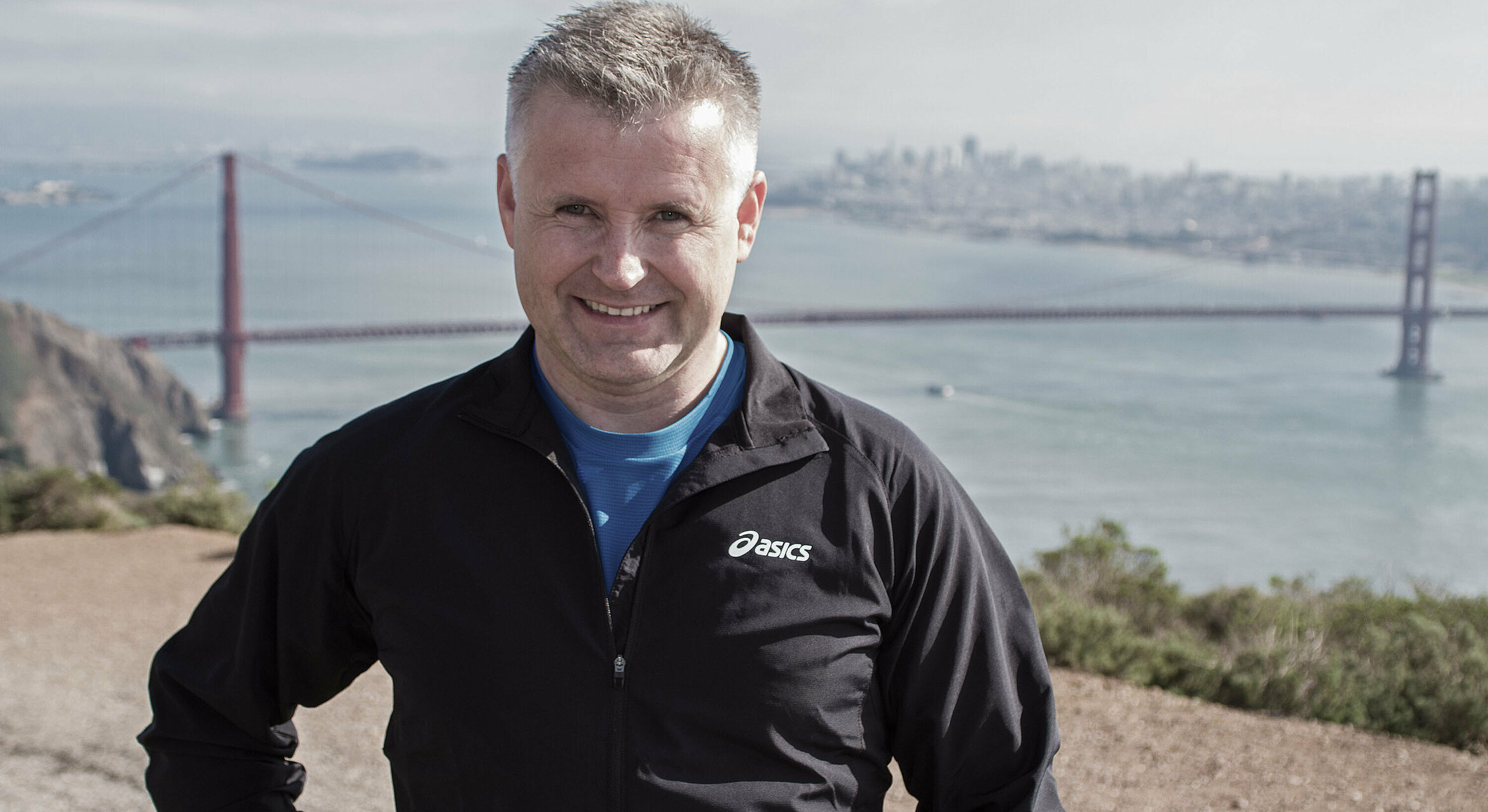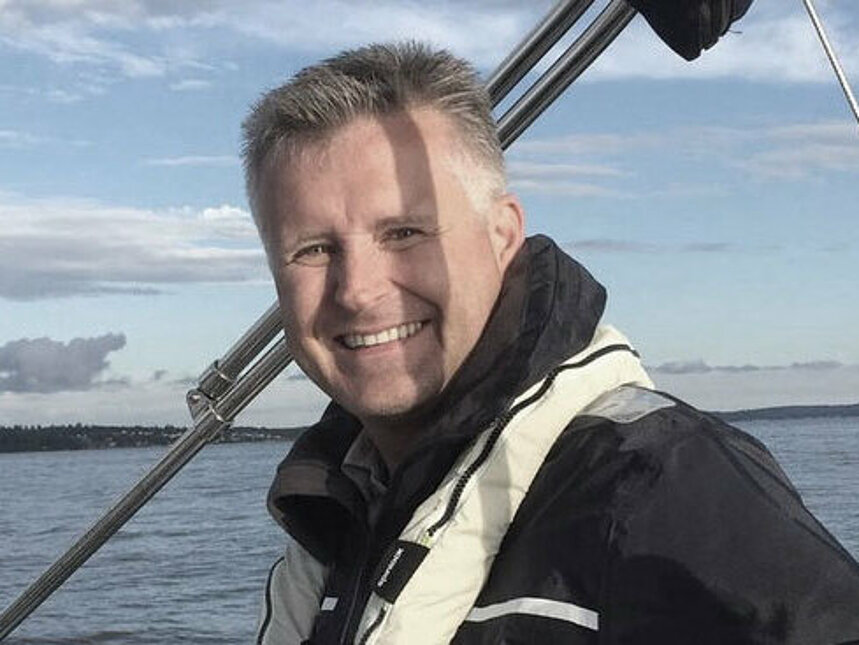
Roger Larsen
Every man with prostate cancer has his own, personal story to tell.
Progether. A single word that hopes to become everything Roger Larsen, 44, was missing in his darkest hour. It is a portmanteau: PRO stands for ‘prostate cancer’ and the GETHER is taken from ‘together’. This is how a unique community was born.
“Eleven million men around the world are affected by prostate cancer. A million men are diagnosed each year, including 70,000 in Germany alone. And there was no database where men could add their personal experience – the things that helped them most, the treatments that proved most successful.” For Larsen, an internet entrepreneur who divides his time between Norway and Silicon Valley, this was simply incomprehensible.
Desperate for answers to questions about his diagnosis, he found five million pages on the topic online. However, he didn’t find anything that hinted at a community – a sense of togetherness. Nothing resembling an aggregation of the experiences of men around the world with prostate cancer. Nothing tapping into the cumulative power of doctors, scientists and researchers who have devoted their entire lives to this malignant male tumour.
“Every man has around 1,000 prostate twins”
Every man with prostate cancer has his own, personal story to tell. All the same, it is estimated that each man has around 1,000 ‘prostate twins’ around the world – other men with an almost identical diagnosis. “What have they done? What has helped them? How are they doing? What options did their doctors put forward for them? How have they adapted their lifestyle? That’s what I wanted to know. But I couldn’t find it anywhere.”
One of the potential side effects of receiving such grave, serious news is that, as patients reflect on their own vulnerability and mortality, they discover previously untapped potential within themselves. Roger Larsen is just one example. “I felt as though I was being robbed of my entire life,” he says. “I wanted to know if there was somebody out there going through the same thing as me. Progether is by far and away my most significant project.” He repeats this time and again. “No man should go through what I did… facing a tangled mess of information devoid of any structure or organisation, which ultimately just leaves you even more perplexed than you already were. I’m an internet expert. But what would a man of 70, 80 years old have done without my background?”
He researched online to find the best conceivable clinic. In the end, he settled on the Martini-Klinik in Hamburg. He hopped on a flight without an appointment, landed in Fuhlsbüttel and called from there. “I need an appointment,” he said. He was told the earliest available slot was in 14 days. “I’m at the airport now. I’ll be there in 45 minutes,” replied Larsen. That is, by and large, how he approaches life. Now. Right away. No time to lose.
It was clear he needed an operation. “That part of the meeting with Prof. Dr. Thorsten Schlomm didn’t last more than five minutes.” He then turned to the problem that had so overwhelmed him: the uncoordinated chaos of online information. Together, the pair resolved to do something about it – by establishing a global portal for men affected by the disease. “Initially, I said no, because I didn’t know anything about science. But then I thought: ‘I’m the one with the problem! If I don’t do it, who will?’”
Over the course of his career, Roger Larsen has developed and invested in numerous internet projects for millions of users. They include a learning management system that encourages children to engage in problem-solving at school rather than sitting bored in hour after hour of lessons. He has also invested in programs that enable children to record their biggest dreams for themselves. Another platform is a solution for schoolwork that draws on a wide range of cartoons and enables children to produce videos, which also complements national curriculums.
Creativity grows as anxiety rises
Larsen found himself grappling with the burning question of why nobody was providing relevant information for patients to help them make informed, personalised, smart decisions. “I had a great urologist back at home but even he had more questions than answers.”
In every project he finances or develops, Larsen asks himself the following questions: Is there a problem? Is it important? Does it affect a lot of people? Would solving this problem make a positive difference?
His search for a suitable solution enabled Larsen to keep a lid on the terrible anxiety that had gripped him. “If I suffer a relapse, there won’t be any curative options left.” That is to say, if the cancer returns, it won’t be curable. Every single man diagnosed with prostate cancer must learn how to handle this anxiety – even if things go as well as they did for Roger Larsen. Even when there are no signs of a relapse.
One aspect that is often forgotten is that there is usually no indication that a person has prostate cancer.
In countless cases, the diagnosis hits people like a bolt of lightning from a clear blue sky. And, because men tend to neglect check-ups and screening appointments, the cancer then spreads further than it otherwise might. Even Roger Larsen missed a routine check-up and waited two years to see his urologist. This was despite his grandfather having died from prostate cancer and his uncle developing the disease. A family history of cancer always increases the risks considerably. “As a young man, I just never really considered the risk.” He was still young, 40 years old, when he was diagnosed.
Since then, he has become increasingly aware of the complex chain of events that leads to a prostate tumour forming. He joins men affected by the disease together as if with an invisible tether, offering them a digital hand of support and friendship, turning the loneliest time of their lives into one of community.
All men can enter their data (securely, anonymously and free of charge) on www.progether.com, so that their experiences can help others. The platform asks for data from PSA level to Gleason score and surgical method. Men can outline whether they suffered post-operative issues such as incontinence or impotence. They can add whether they underwent chemotherapy, radiotherapy or hormone therapy, or benefited from new genetic therapies. “Not everything is equally unpleasant or suitable for everyone. For me, the idea of incontinence was far worse than the idea of impotence. Quality of life is always a key focus. Your priorities can impact a range of things, such as the surgical method you choose.”
Progether: shaping the future
How did a man live before his diagnosis? How about afterwards? Does he exercise? What is his diet like? Does he drink a lot of green tea and eat plenty of berries? What does his sleeping pattern look like? Each individual case incorporates all these details. The platform shows how each man’s circumstances align with those of other men, who has what form of cancer around the world and what has helped them.
“Everything has consequences,” says Roger Larsen. “Progether will help to protect men against the consequences of making the wrong decisions.”
What are the requirements for getting involved? “Contribute your knowledge, your experiences, and share them with others.”
“Many of my friends have been overtreated,” says Larsen. Countless man receive unsuitable or insufficient treatment.
In its current pool of 300 articles, Progether offers men information, explanations and options, adapting the content it provides – with the help of leading scientists around the world – when just one parameter of a user’s diagnosis changes.
“This saves a huge amount of time and reduces anxiety. The more men that take part, the more precise the algorithms will become.” The platform’s algorithms compute almost in real-time which users opted for which treatment, where that treatment was provided and what the outcomes were.
The portal does not rely on users’ real names and does not feature chat rooms. “However,” says Larsen, “we plan to offer live discussions to enable men with identical case histories to share their experiences. This means everyone can adopt an active role rather than helplessly drowning in data.”
By embarking on this project, Roger Larsen has reshaped the future of ALL cancer patients, including his own. “For me, everything changed after I got my diagnosis,” he says. “I’m far more deliberate in how I spend my time: not later – now! I only work half as much as I used to.”
Larsen became a father for the first time at 19. One week after he was discharged from the Martini-Klinik, he celebrated the birth of his fifth child, a daughter. Her life began at a time when the world of medicine was being transformed forever.

Around the world, 11 million men are living with diagnosed prostate cancer. A million men receive this diagnosis every year. Each and every one of them has their own unique experience to share. Progether is working to gather this knowledge and make it available to patients, doctors and researchers in the hope that, together, we can improve the treatment of prostate cancer.
Further information: www.progether.com
